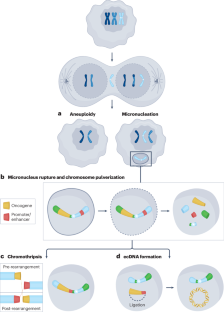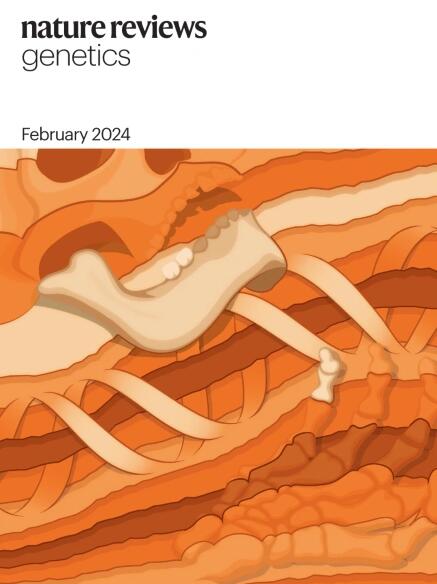Chromosomal instability as a driver of cancer progression
IF 39.1
1区 生物学
Q1 GENETICS & HEREDITY
引用次数: 0
Abstract
Chromosomal instability (CIN) refers to an increased propensity of cells to acquire structural and numerical chromosomal abnormalities during cell division, which contributes to tumour genetic heterogeneity. CIN has long been recognized as a hallmark of cancer, and evidence over the past decade has strongly linked CIN to tumour evolution, metastasis, immune evasion and treatment resistance. Until recently, the mechanisms by which CIN propels cancer progression have remained elusive. Beyond the generation of genomic copy number heterogeneity, recent work has unveiled additional tumour-promoting consequences of abnormal chromosome segregation. These mechanisms include complex chromosomal rearrangements, epigenetic reprogramming and the induction of cancer cell-intrinsic inflammation, emphasizing the multifaceted role of CIN in cancer. Chromosomal instability (CIN) drives cancer progression through diverse mechanisms. The authors review the molecular consequences of CIN in advanced cancer, such as genomic and phenotypic heterogeneity and cancer cell-intrinsic inflammation.


染色体不稳定性是癌症进展的驱动因素
染色体不稳定性(CIN)是指细胞在分裂过程中获得染色体结构和数量异常的倾向性增加,从而导致肿瘤遗传异质性。CIN 长期以来一直被认为是癌症的标志,过去十年的证据表明,CIN 与肿瘤演变、转移、免疫逃避和耐药性密切相关。直到最近,CIN 推动癌症进展的机制仍然扑朔迷离。除了基因组拷贝数异质性的产生,最近的研究揭示了染色体分离异常的其他肿瘤促进后果。这些机制包括复杂的染色体重排、表观遗传学重编程和诱导癌细胞内在炎症,从而强调了 CIN 在癌症中的多方面作用。
本文章由计算机程序翻译,如有差异,请以英文原文为准。
求助全文
约1分钟内获得全文
求助全文
来源期刊

Nature Reviews Genetics
生物-遗传学
CiteScore
57.40
自引率
0.50%
发文量
113
审稿时长
6-12 weeks
期刊介绍:
At Nature Reviews Genetics, our goal is to be the leading source of reviews and commentaries for the scientific communities we serve. We are dedicated to publishing authoritative articles that are easily accessible to our readers. We believe in enhancing our articles with clear and understandable figures, tables, and other display items. Our aim is to provide an unparalleled service to authors, referees, and readers, and we are committed to maximizing the usefulness and impact of each article we publish.
Within our journal, we publish a range of content including Research Highlights, Comments, Reviews, and Perspectives that are relevant to geneticists and genomicists. With our broad scope, we ensure that the articles we publish reach the widest possible audience.
As part of the Nature Reviews portfolio of journals, we strive to uphold the high standards and reputation associated with this esteemed collection of publications.
 求助内容:
求助内容: 应助结果提醒方式:
应助结果提醒方式:


